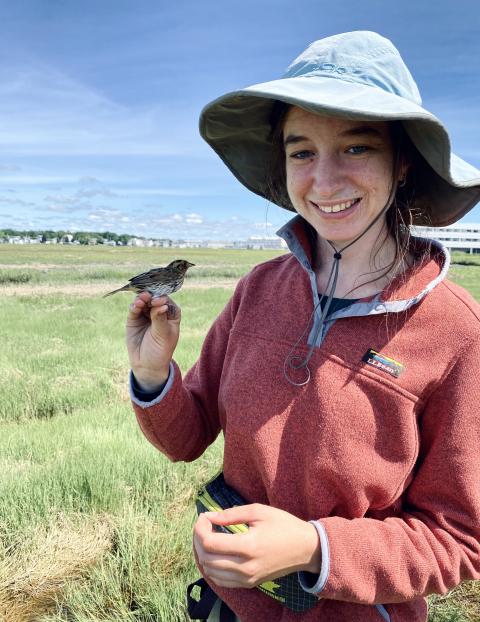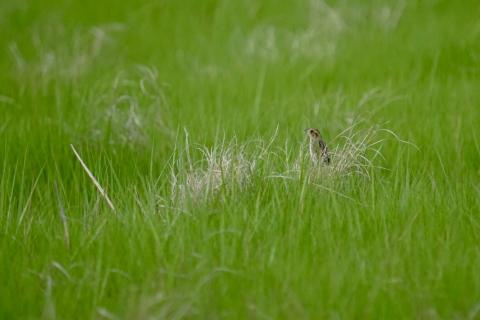
A passion for wildlife and its habitats has been propelling Grace McCulloch out of bed very early this summer. On weekday mornings, Grace wakes at 3:30 a.m. and heads to one of the many sites in New Hampshire where she’s studying the birds that depend on the climate-change-threatened saltmarsh habitat.
In August, she will begin a Margaret A. Davidson Graduate Fellowship at the Great Bay National Estuarine Research Reserve, continuing her research. NOAA’s Margaret A. Davidson Graduate Fellowship is a two-year fellowship program that provides the opportunity for graduate students to conduct collaborative research at one of the 29 national estuarine research reserves.
Grace earned her bachelor’s degree in wildlife and conservation biology at UNH in 2021, and she is now pursuing her master’s degree in natural resources: wildlife and conservation biology. Along with studying birds, Grace also loves to photograph them. The Pembroke, N.H. native invites anyone who is interested in New England wildlife to follow her photography account on Instagram: @grace.eliza.photography.
Grace McCulloch: My master’s research is focusing on tidal marsh birds across New Hampshire, documenting their distribution and relative abundance, and examining the factors that predict this.

Saltmarshes are teaming with life. They are critical habitat for species of special concern, like the saltmarsh sparrow. They also protect communities from coastal flooding, filter water, and are an important carbon store.
As sea-level rise threatens important saltmarsh habitat, coastal planners at Great Bay National Estuarine Research Reserve and the U.S. Fish & Wildlife Service’s Atlantic Coast Joint Venture are creating tools that local communities in NH can use to prioritize restoration of marshes. My research will build on these tools by adding birds to the picture, exploring how the tools can prioritize marshes for the birds’ benefit. This will be particularly important for species like the saltmarsh sparrow, which is experiencing a range wide population decline of 9% each year. The ultimate goal of my research is for more informed decision-making in saltmarsh management. I am excited to be part of a network of coastal researchers seeking to protect saltmarsh habitat!
Grace: Every day on the saltmarsh is different. It is always a pleasant surprise to see something new like a river otter swimming in a channel or an osprey feeding her chicks.
Learn more
Grace: Working in the saltmarsh is never easy but I am working with wonderful people like Brooke Healy ’23, a UNH undergraduate conducting her own research alongside my project. The tides, deep holes, unstable ground, insects and weather all pose challenges. Birds are also early risers. Waking up at 3:30 a.m. for bird work isn’t always easy, but watching the sun rise over the marsh never gets old!
Grace: A passion for wildlife and their habitats drives me. An early fascination with nature has grown into a passion for conservation and a realization that we must all take action to protect our beautiful planet and the animals (us included) that call it home.
Grace: I am honored to be the Margaret A. Davidson Fellow for Great Bay National Estuarine Research Reserve. The more I learn about the reserve and the people who work there, the more I am excited for the Fellowship’s mentorship, professional development, and research opportunities.
Grace: I am thrilled to be returning to UNH for my masters! I had a great experience as an undergraduate and already knew the department of natural resources and the environment to be a welcoming community with phenomenal faculty and research opportunities.
Grace: I am looking forward to a career in wildlife biology that seeks to protect vulnerable ecological communities and provide the research stakeholders need to make informed decisions. Environmental education is close to my heart and whatever career path I choose I will always advocate for greater public engagement in science.